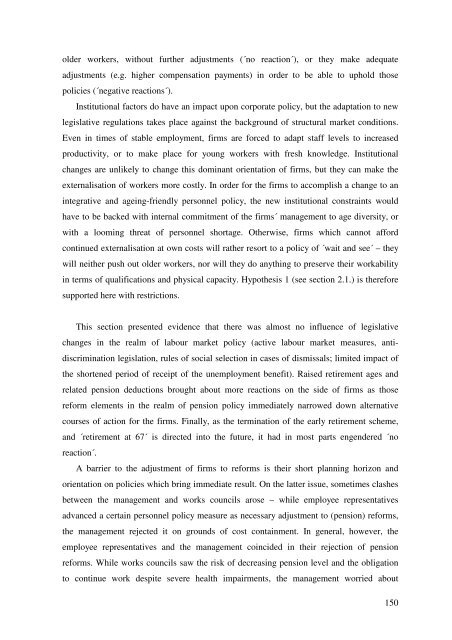Dissertation_Paula Aleksandrowicz_12 ... - Jacobs University
Dissertation_Paula Aleksandrowicz_12 ... - Jacobs University
Dissertation_Paula Aleksandrowicz_12 ... - Jacobs University
You also want an ePaper? Increase the reach of your titles
YUMPU automatically turns print PDFs into web optimized ePapers that Google loves.
older workers, without further adjustments (´no reaction´), or they make adequate<br />
adjustments (e.g. higher compensation payments) in order to be able to uphold those<br />
policies (´negative reactions´).<br />
Institutional factors do have an impact upon corporate policy, but the adaptation to new<br />
legislative regulations takes place against the background of structural market conditions.<br />
Even in times of stable employment, firms are forced to adapt staff levels to increased<br />
productivity, or to make place for young workers with fresh knowledge. Institutional<br />
changes are unlikely to change this dominant orientation of firms, but they can make the<br />
externalisation of workers more costly. In order for the firms to accomplish a change to an<br />
integrative and ageing-friendly personnel policy, the new institutional constraints would<br />
have to be backed with internal commitment of the firms´ management to age diversity, or<br />
with a looming threat of personnel shortage. Otherwise, firms which cannot afford<br />
continued externalisation at own costs will rather resort to a policy of ´wait and see´ – they<br />
will neither push out older workers, nor will they do anything to preserve their workability<br />
in terms of qualifications and physical capacity. Hypothesis 1 (see section 2.1.) is therefore<br />
supported here with restrictions.<br />
This section presented evidence that there was almost no influence of legislative<br />
changes in the realm of labour market policy (active labour market measures, antidiscrimination<br />
legislation, rules of social selection in cases of dismissals; limited impact of<br />
the shortened period of receipt of the unemployment benefit). Raised retirement ages and<br />
related pension deductions brought about more reactions on the side of firms as those<br />
reform elements in the realm of pension policy immediately narrowed down alternative<br />
courses of action for the firms. Finally, as the termination of the early retirement scheme,<br />
and ´retirement at 67´ is directed into the future, it had in most parts engendered ´no<br />
reaction´.<br />
A barrier to the adjustment of firms to reforms is their short planning horizon and<br />
orientation on policies which bring immediate result. On the latter issue, sometimes clashes<br />
between the management and works councils arose – while employee representatives<br />
advanced a certain personnel policy measure as necessary adjustment to (pension) reforms,<br />
the management rejected it on grounds of cost containment. In general, however, the<br />
employee representatives and the management coincided in their rejection of pension<br />
reforms. While works councils saw the risk of decreasing pension level and the obligation<br />
to continue work despite severe health impairments, the management worried about<br />
150
















